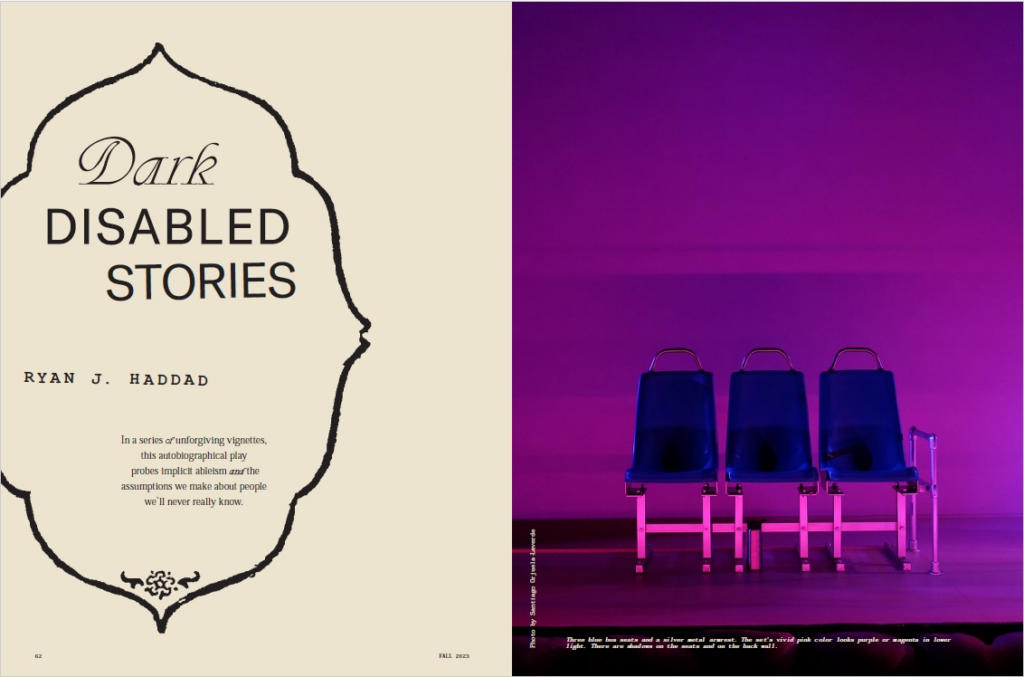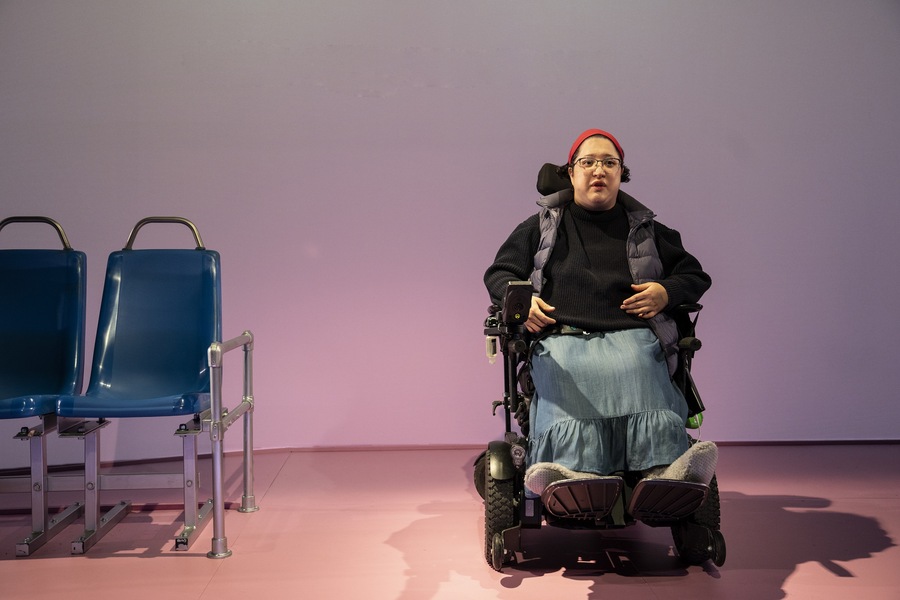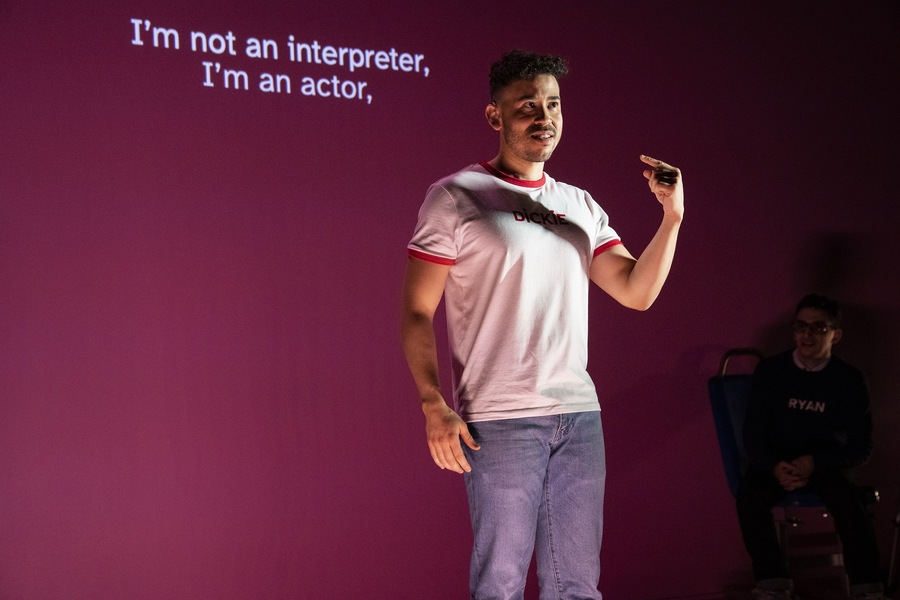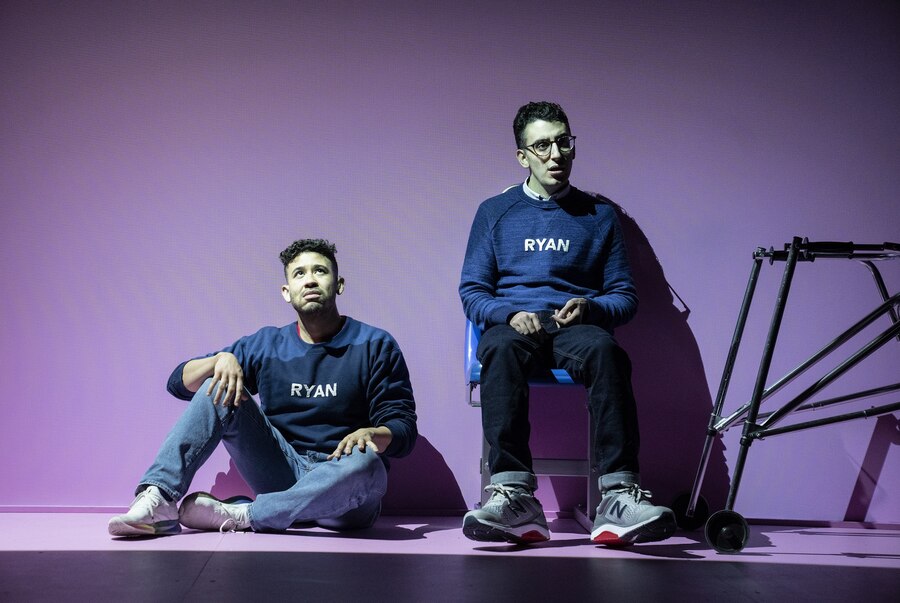In Dark Disabled Stories—the complete script of which is available only in our Fall 2023 print edition—playwright/performer Ryan J. Haddad recounts complicated moments moving through a world not built for him. For an interview accompanying the published play, Haddad spoke to James Ijames, Pulitzer winner for Fat Ham, about his inspirations, his process, and what he learned from making the show.

JAMES IJAMES: I love your play. I walked away from it feeling like I’d seen something I’d never seen before. I’d love for you to tell me where the germ of the idea for the play started.
RYAN J. HADDAD: Jessica Almasy, a writer and actress, was curating something called American As Fuck, or American AF, in response to Trump being our president in that first year. She wanted me to perform something brief, but I knew none of my previous storytelling work fit the bill. So I said, I gotta be gutsy here. Around that same time, several of the stories I tell in the show had happened in relatively quick succession, and I thought, Oh, my goodness, what is this? Why do these things make me feel icky and gross, and why are they all happening at once? How do they fit together? So that was the experiment, to just go up and tell the stories. I had a tote bag with a change of clothes in it, and I stripped down to my underwear, which was a callback to my first play, Hi, Are You Single?, and then I got dressed again. By the time I put on the second outfit and put on my leg braces and tied my shoes, it was over, and that was the visual gesture. It was 20 minutes; might have been 30. No one recorded it, which is a grave mistake—something that I tell my students not to do. Always record, especially if you’re improvising, because you have no idea what’s going to come out of your mouth, and how and why and in what order. The very next opportunity I had to get up at a microphone and record it, I did. That was at Drae Campbell’s TELL queer storytelling hour at the LGBT Center.
Those were the seeds. And in terms of, why those stories? I don’t know. It was just, here were three things that had just happened, and here were three other things that had been looming in my mind that had not yet found a place in any of my other work. It all felt a bit transgressive, a bit scary, and different than what I usually tend to perform. In 2019, when Jordan Fein came on as the director, he asked, how do we make this a play? How do we make this an event with an arc? Because there wasn’t a plot, and it wasn’t all on one theme. We had to find the script as it is now. So much of what you’ll read in the text is thanks to Jordan’s dramaturgy, as well as his direction, and also that of our production team, including Jordan’s associate director, Kedian Keohan, and the two cast members, Dickie Hearts and Alejandra Ospina—their stories are in the play as well. Even when I would be chewing on something in rehearsal, a quote-unquote Ryan monologue, they would help me turn that over with their own experiences. Andrew Morrill, our Director of Artistic Sign Language, translated the whole script into ASL, guided Dickie’s performance with Jordan, and helped ensure a Deaf-friendly audience experience.
And I want to credit Alison Kopit, our access dramaturg. She started as an access consultant, doing the outward-facing work for audience access, and then on day one of working together, she said, “I have a few script notes, do you mind if I give them to you?” We started to realize, she’s doing way more for the soul of the play than just access for the audience. She changed and heightened the caliber of the storytelling through her disability inclusion lens, and also just disability politics that I don’t always bring to everything. Because I’m just telling stories that happen to Ryan, and I don’t always know, what is the impact of this word or this phrase or this paragraph when an audience member is sitting there and hearing it as, “This is what the disabled experience is,” instead of, “This is what my disabled experience is like.”
My plays would not work without strong people saying, “This is where it needs to go,” “This is what you’re trying to say.” In getting those deeper, harder-to-reach things out of me, collaborators reflect back what my work is doing that I don’t quite realize.
I want to lift up this notion of access dramaturgy—you’re introducing me to this language, and I think it’s powerful language. That may be a missing piece of how we make theatre. I’m suddenly thinking about all of the instances I’ve been in where I’m like, “Oh, I could have used somebody to help me right now with making this feel accessible.” So that’s beautiful.
We went in believing that this was going to be produced at the Bushwick Starr in 2021, in their iconic building on Starr Street, which had been made newly accessible in various ways. Then in the midst of the pandemic, everything got delayed, the Bushwick Starr lost its building and had to go buy a new one, and they needed to find a co-producer and a venue where we could do the play. So we had two extra years to make this. And Jordan and I had all this time on Zoom in which we just sat there talking about the text, but also talking about the world we were creating. And we kept saying, “What does it look like? Where is Ryan when these stories are being told?” I realized something I had been learning over the years being in New York, prior to the start of the pandemic, which was that I would go into other performance spaces that were not theatre—primarily dance, also visual art and some music stuff—in which all of this access was incorporated. It was a given. It created its own aesthetic, a disability aesthetic, which I hadn’t previously used in my work. I just had a walker and thought that was enough. But in all these conversations about the design, we realized the design could be access. We knew there would be audio description and captions and ASL. But then we figured out that it would be two performers who were integrating the audio description and ASL, not just adding it on after the fact. Then we brought in Alison, whose top-line job was going to be like, “Let’s make sure that the access that we’re saying we’re putting into the play is gonna work.” And then it just kept getting deeper and became this beautiful experience.

I am always okay telling other playwrights the things that I’m jealous of in their work. There’s this moment early in the play where you look out in the audience and you say, “If you are sad or feeling pity, maybe leave.” There was something so masterful and beautiful about centering the marginalized experience and needs in that moment. It made me think instantly about What to Send Up When It Goes Down, by Aleshea Harris, which is similar but different. I’d love to hear you talk a little bit about what it was like to look out at the audience and say that. Did anybody ever leave?
No one ever left. But it was fascinating to me to feel the differences every night of how people would react. The reason it’s in there is that disabled folks are aware of the biases people have, and how we are interpreted by the larger society, and the ableism that’s inherent everywhere, right? People are taught, especially if they are not disabled themselves or are not particularly attuned to the experience of disability through relation or family or friends or loved ones, that the go-tos are pity and inspiration. Either you see me pick up corn on the cob at the vegetable stand and you applaud and go, “Isn’t it amazing that he is alive? And my life is better than his, so I shouldn’t be so upset about what I’m going through.” That is the trope of inspiration—people being inspired by our existence in the world and our audacity to take up space. And then pity is this notion of, “Wow, it must be really hard for you. I’m just so sad. I’m so sorry that you have to go through this.” When you’re talking to somebody like me, who has been disabled since birth, it’s absurd. Because this is all I’ve ever known. I know that’s not true of every person who is now disabled, and I also know that there are other people who have different relationships to their disability in different parts of the country, and/or who had different upbringings, different family systems than I did, who were not empowered the way I was to just own it, to not hide from it or be ashamed of it or sad about it. That is how I was raised, to be proud and know that I had talent and that I was going to make an impact on the world. That was put in me as a child.
People keep saying, “Are you going to have a sequel to Dark Disabled Stories?” And I’m like, well, no, I have other plays—I’m not thinking of Dark Disabled Stories 2, like Sex and the City 2. But they just keep happening to me, so now I can say to people, as a shorthand, “Oh my gosh, guys, I just had a dark disabled story,” and they know what I’m talking about. So I was just in a doctor’s office for something not disability-related at all, and this perfectly lovely technician, who reminded me of one of my great aunts, very sweet, very well-meaning, just kept doing a monologue for herself and for me about how hard it must be for me to get around, but isn’t it great, isn’t it wonderful that I can? I know what she’s saying, and I know that the intention behind it is positive. But also underneath it is pity; underneath it is ableism. I’m just laying on the table, getting a medical test; I’m not here to provide education or therapy to somebody else. And that’s just an anecdote from this month, right?
So going back to the actual moment in the play, I would look out and realize that this is what I was up against. If there were disabled people in the audience, which there often were, those people heard that line and there were hoots and hollers and laughs and cheers. And then there were nights—or days, matinees—when it would just be completely dead, and they wouldn’t utter even a chuckle. It’s a very honest line. It’s full of tension. But I’m an entertainer, bitch, so it’s supposed to be funny. You’re supposed to laugh. It was built so we would gesture to one side, and then the other, and if we didn’t get a laugh on the second one, I knew we were in for an interesting performance.
If they didn’t laugh, I’m not saying that it’s a bad thing. And maybe I’m not being fair, because there are a lot of times, it doesn’t matter if I wrote the play or somebody else, but you will come offstage and say, “That audience, oh my God, they just did not get it,” and then you come out for the curtain call and they’re freaking out and screaming and crying afterward. They did totally get it—they just got it in silence. I’m also very aware that I’m grading it based on laughter, and standing next to me is Dickie, a Deaf person who is not able to do that. So often he would check in with me after each show about certain moments and go, “How were they here? Did they laugh there?” When Dickie came downstage center in his spotlight and did his 11 o’clock number—I mean his monologue, you know, but I talk about everything like it’s a musical—the house lights would come up a little bit and he would be grading the reaction based on audience body language, facial expressions, which is harder, because most of the audience wore masks the whole time, but just based on how people were moving in their seats or if their shoulders were going up and down. And he would say, “Oh, I felt they were really on board with me,” or, “I didn’t think they got it today.”
I’m not a standoffish person. But if you come in without any knowledge of what you’re about to see, particularly if you don’t know that I’m going to talk about sex and dicks and assholes, and certainly if you’re not going to be okay with the fact that I’m a raging, horny homosexual, then the show is going to be a little harder for you to swallow.
I think one of my favorite parts of writing plays is balancing the darkness with the humor. You put the darkness in your title. I would love to hear you talk about that.
Darkness is newer for me in this way. It’s present in every piece of my writing, which is why when people go, “Oh, you’re a comedian,” I go, “Did you hear the last 20 minutes?” That’s true of all the plays. Hi, Are You Single? has a lot of darkness in it, but the structure of the comedy is that I will take a really difficult moment, then immediately follow it with a wallop of a joke, as a means of making the audience more comfortable. I’m not inventing the wheel when I say that. Comedians and storytellers have been doing that for hundreds of years. But often that’s the easier thing to do, because it helps you sort of control what the audience is feeling at any given time. You can manufacture the arc of their emotions, nine times out of ten, if it’s a really tight script.
Dark Disabled Stories is a very dark-forward show. There’s a lot of humor, there’s a lot of laughter, but I do not follow the difficult things with an immediate laugh. I go there, and then I keep you there until I want to release you, as opposed to, I have to put a joke here so that you can take a breath, so that you’re more at ease. My instinct as a performer is to put you at ease. But here I’m letting the humor in the text speak for itself, and not shielding you from the moments that are really tough.
A line that’s gone that was in the script for a long time was: “There’s not always a punchline.” I don’t wake up in the morning, living alone in my studio apartment, and start cracking jokes to myself. Often I’m stepping out into the world to go pick up tickets to a play, or go to a meeting, or pick up a new tie for a wedding. I have a destination, and somewhere along the way, whether it’s in a store or in a taxi or on an exam table, suddenly I’m faced with a moment of misunderstanding. You know, I’m just here to buy a tie, to take this test, to get from A to B, and you’re making it about my disability in a way that it doesn’t need to be at all. And in those moments—they’re great stories, but it’s not fun. I don’t immediately sit there and think, “This is funny.” That’s why in this play the humor is not used as a shield or a security blanket, like the stuffed animal you can hug when things feel a little eerie. Humor is used sparingly and very intentionally. It’s a fucking funny play, but the humor this time does not let you off the hook in the ways that I have allowed it to, on purpose and to great effect, in my other writing.

I am always really impressed when writers write from their lived experience. I think I have a hard time with that, because I don’t think my life is all that interesting. What have you found have been the complexities of writing and performing your own lived experience onstage? And also, what are the personal benefits to doing that?
The big complexity, I would say, is that people assume that they know me. I give you an hour or 70 minutes, and maybe you’ve seen multiple pieces of my work, and you are filling in threads and coloring in the lines in a way that an audience on first view isn’t going to. I’ve had people, some of whom have become great friends, others people I’ve never met again, who come up and say, “Oh my God, I feel like I know you! We’re besties!” And I go, “Well, no, because I have no idea who you are. That’s not how friendship works.” What’s complex is the assumptions people make about your demeanor or personality, and that they feel entitled to a connection with me because of what I just gave them. There’s a presumption that some boundaries go away because of what I’ve shared, and I have learned that I need to be protective of myself as a person, to keep some safeguards up.
You know, everything comes back to my family. My family were my first acting teachers. None of them have qualifications to be acting teachers at all, but we did plays together in the backyard, in the living room, starting when I was five—I have a whole cabaret about that. So they were sort of my acting troupe, and they all would dive in and do these plays with me, for almost a decade of my life. So they have an understanding of why and how this matters to me, and they were so intrinsically a part of it in a way that goes beyond, you know, Mom and Dad went to the middle school play. They have memories that belong to them as much as they belong to me, so when they come and see my plays now, it’s very much a full circle experience for them, and there’s a lot of pride in it.
And here we are at the Public Theater, produced by the Bushwick Starr, my Off-Broadway playwriting debut, and they are beside themselves, elated and proud. And yet it’s not easy material to digest. With Dark Disabled Stories, my mom and dad and aunt, Janice, told me, “We need to be prepared.” So I sat down on my birthday at our dining room table in Cleveland, a month before we started rehearsals, and I said, “Here are the four darkest stories.” I didn’t perform them, I just said, “This is what happens,” so that when they’re sitting there on opening night, they’re not going to pass out. I want them to be able to enjoy it for what it is, a piece of theatre, and not be scared for me, their son or their nephew. It’s complicated to get up and tell these stories in front of your family, but I have the most supportive family in the world. So I’ve just figured out the ways to make it as low-impact a collision for them as I can.
The biggest benefit, I think, is that I get to show an audience many parts of myself. That’s not always true when I’m playing someone else. I mean, I love acting in other people’s work. Sometimes that’s when I have the most fun, precisely because I did not write it. But I really get to dig in when it’s my own stuff. I get to be messy and vulnerable and sexy and fabulous and horrible and mean and petulant and lovesick and hopeful, all of these different colors, these different sides of my personality. I’ve been fortunate to play roles that have offered me some of those colors before, but when I’m playing the character of Ryan, it’s just given. Because I’m up there being me, or a version of me, and the truth is that, like everyone else, I can be all of those contradicting things at once. Until recently it’s been rare for disabled characters to be written with that kind of range. It’s a privilege to hold an audience’s attention. I have to earn their time and trust, and to do it right, I can’t only show them what’s flattering. I have to be honest. Honesty is the minimum. And hopefully that makes them want to come back for whatever I do next.


